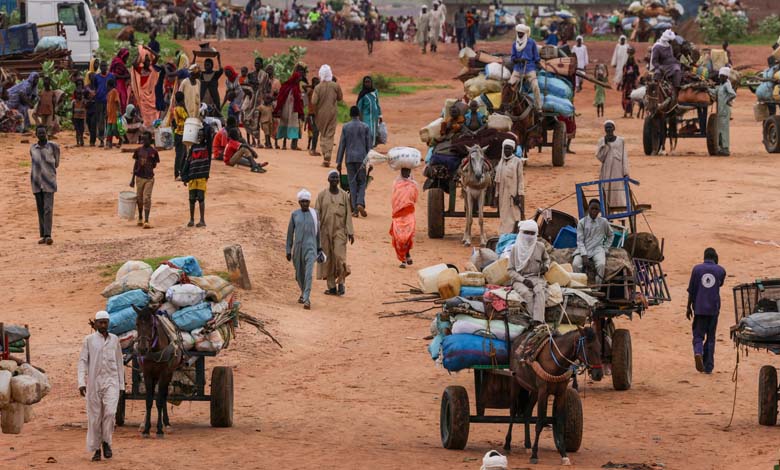One-Third of Sudanese Farewell from Exile “The Most Tragic Year”

As the world celebrated the end of 2024 and the arrival of a new year, many Sudanese in the Shambat area of Khartoum Bahri and other parts of the country spent the last hours of the year searching for safe routes to cemeteries to bid farewell to relatives and neighbors who fell victim to aerial and ground bombardments targeting various regions of the country, which has been embroiled in continuous war since April 2023.
-
UAE Ready to Cooperate with Turkey to Resolve Sudan Crisis
-
Sudan in 2024: A War That Reshapes the Map of Control and Influence
This war has claimed the lives of more than 150,000 people, according to estimates by Tom Perriello, the U.S. Special Envoy for Sudan.
It has also displaced nearly 15 million people from their homes and plunged over 25 million into hunger amid a dire economic collapse and extensive infrastructure destruction.
A Human Tragedy
Reflecting the immense humanitarian tragedy gripping the country, about one-third of the population spent 2024 in exile, far from their homes, forced to flee by war into a journey of displacement and asylum amidst an unprecedented humanitarian catastrophe that defined the year.
-
Sudan in 2024: Armed Groups Abandon “Neutrality” and Escalate the War
-
Escalation of Airstrikes in Sudan: Protests Against Civilian Bombing and Calls to Protect Innocent Lives
Throughout 2024, the severe deterioration of humanitarian conditions, the bloody scenes, and the widespread destruction that affected almost every aspect of life in Sudan dominated global media coverage.
Journalist Mohamed Mokhtar described 2024 as the year when “Sudanese dreams of ending the war, stopping the bloodshed, and returning to their homes and normal lives were buried.”
He said: “Supporters of war continuation managed to sabotage all opportunities to halt the conflict through negotiations. Many Sudanese, who were deceived by the propaganda of the Muslim Brotherhood organization that threatened war and actually ignited it, are gradually waking up to the truth.”
-
Sudan’s Failing Healthcare System on the Brink of Collapse
-
Sudanese Analyst: Khartoum Caught Between Fire and Famine… Civil War Exacerbates Human and Economic Suffering
Grave Violations
The year was marked by significant war violations against civilians, confirmed in a UN mission report rejected by the government based in Port Sudan.
In 2024, over 3,000 people were arrested or pursued on ethnic or political grounds, while more than 4,000 were killed in airstrikes, and dozens of unarmed civilians were executed in Khartoum Bahri and several areas of the island.
According to Rehab Al-Mubarak, a member of Lawyers for Emergency, the defining features of 2024 included forced displacement, systematic killings based on identity, the spread of hate speech, racial segregation, and blatant violations against civilians through airstrikes, shelling, and drone attacks.
-
Sudanese Demand an End to the Violations of the Muslim Brotherhood Brigades
-
Muslim Brotherhood Training Tens of Thousands of Youth for Combat… What Awaits Sudan?
She said: “This year witnessed widespread retaliations by both sides, accompanied by a wave of forced displacement affecting thousands in dozens of villages and cities. Hundreds of detainees remain imprisoned on charges of affiliation or support for one side or the other.”
Health Collapse
Tens of thousands of victims fell under continuous aerial and ground bombardments, as well as hunger and infectious diseases, with over 70% of hospitals and healthcare facilities rendered inoperative.
Adiba Al-Sayed, an epidemiologist and leader within the Sudanese Doctors’ Union, said that 2024 was the worst year for the health sector, witnessing the systematic destruction of hospitals and healthcare facilities.
-
Efforts to Bridge the Divide within the Islamic Movement… The Sudanese Muslim Brotherhood on Hot Coals
-
How the Muslim Brotherhood Reshaped the Sudanese Army
She said: “The health situation reached catastrophic levels this year, with outbreaks of diseases such as cholera and dengue fever, which claimed thousands of lives, along with other illnesses like malaria, tuberculosis, and childhood diseases, whose infection rates surged due to the severe lack of vaccination campaigns.”
Reproductive Health and Increased Suffering
Ms. Al-Sayed warned of the growing suffering of the elderly and those with chronic illnesses, along with a significant decline in reproductive health, where 680,000 women lost their lives during childbirth.
-
Sudan on the Brink of Total Collapse: War Consequences and Policy Failures
-
Sudanese Children Pay the Price for the Brotherhood’s War
Economic Deterioration
The Sudanese ended the year grappling with the issue of having two currencies in one country, a situation exacerbated by the war. An initiative by the Central Bank to change the currency in the last month of the year failed due to the loss of control over more than 70% of the country’s regions.
The year 2024 also witnessed extensive destruction of productive infrastructure and its foundations across all sectors of the Sudanese economy, with losses currently estimated at around $800 billion, according to economist Wael Fahmi. These losses include the economic repercussions of rising unemployment, which has reached over 60%, as 10 states have almost entirely ceased economic and productive activities. Additionally, poverty now affects nearly 70% of the population, and more than half of the 48 million inhabitants are threatened by famine.
-
Conflicts among Militias Recruited by the Army Threaten to Ignite Eastern Sudan
-
Sudan War: The Flames Encircle El-Fasher from All Sides and ‘Path of Hope’
Fahmi explained that, “in addition to the massive destruction of productive infrastructure, the prominent feature of Sudan’s economy in 2024 was the continued flight of capital and workforce, alongside the escalation of smuggling operations of the country’s resources. This has resulted in a sharp contraction in Sudan’s GDP, estimated to have shrunk by over 60% according to preliminary indicators, due to the ongoing war and its accompanying destruction.”
He continued: “The prolonged duration of the conflict and the expansion of fighting into new regions during the year caused a sharp decline in budget revenues, estimated at over 85%. This implies a continued worsening of the budget deficit, as public spending inevitably rises due to the expansion and intensity of official military efforts across all states currently affected by the war.”
-
Dindar: Tribal Conflict Turns into an Unforgivable Crime by the Sudanese Army
-
Ethnic Cleansing in Dinder… Humanitarian Tragedy Caused by the Sudanese Army
Fahmi also highlighted the worsening current account deficit in the balance of payments, leading to a deepening public debt crisis, both domestic and foreign, as is typical in wartime situations worldwide. This crisis stems from declining export revenues and increasing imports, causing the Sudanese pound to continue depreciating, with a 240% drop recorded during the year.
Conflict Takes a Regional and Tribal Turn
Academic and political researcher Al-Amin Bilal stated that the conflict in 2024 had taken on a distinctly regional and tribal dimension, presenting the country with unprecedented challenges.
-
Sudan Crisis: What are the Motivations behind the Ministerial Changes and Their Expected Outcomes?
-
Catastrophic Consequences… Millions of Sudanese Children Pay the Price of War. What’s the Story?
Bilal said that the expansion of the conflict and the shifts in positions were the defining features of the year. He added: “The war spread across all regions of Al-Jazirah, Sennar, Blue Nile, and parts of White Nile states, after being confined to Khartoum, parts of Al-Jazirah, and Darfur during 2023.”












